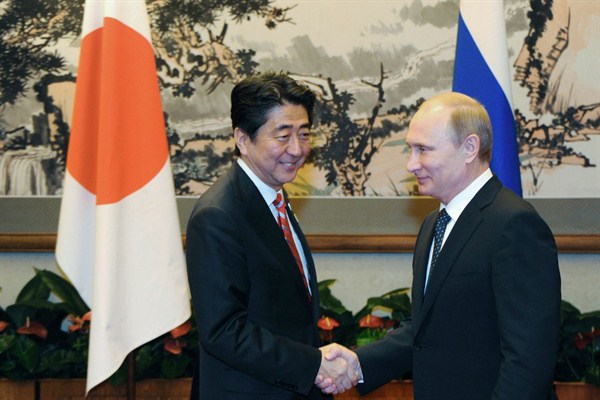Ties between Russia and Japan are slowly picking up steam again after a 16-month chill following Russia’s annexation of Crimea in March 2014. Earlier this month, Shotaro Yachi, Japan’s national security adviser, traveled to Moscow and met with his Russian counterpart to discuss President Vladimir Putin’s plans to visit Japan later this year. And despite ongoing tensions over Ukraine, there are also signs that Japan’s foreign minister, Fumio Kishida, may travel to Russia in the coming months to prepare for a potential Putin visit. Japan-Russia cooperation is also continuing on the security front with bilateral maritime security drills, focused primarily on border security, slated to take place later this month near Russia’s Sakhalin Island.
Since his election in late 2012, Japanese Prime Minister Shinzo Abe has expended considerable diplomatic energy toward repairing Tokyo’s relationship with Moscow. Abe has met with Putin on numerous occasions, including two official visits to Russia. Indeed, Abe’s policy shift on Russia was so dramatic that his visit to Russia in 2013 marked the first official trip by a Japanese leader in a decade. Nevertheless, Japan still maintains a need to balance its desire to improve ties with Russia with its obligations, as a member of the G-7 and chief regional ally of the United States, to sanction Moscow for its involvement in the continuing fighting in eastern Ukraine. After Russia’s annexation of Crimea, Tokyo fell in line with its G-7 partners and implemented a limited set of economic sanctions on Moscow.
Now, even with Ukraine unresolved, Abe is looking to reinvigorate his policy embrace of Russia and maintain a nuanced approach to Putin. This push for engagement is premised on three main pillars. First, Abe remains convinced of his need to resolve the longstanding territorial dispute with Russia over the southern Kuril Islands, known as the Northern Territories to Japan. Second, both Tokyo and Moscow share a desire to enhance their energy partnership. And, finally, both sides have a strategic interest in closer relations as a potential balance or hedge against China’s rapid rise in the region.

